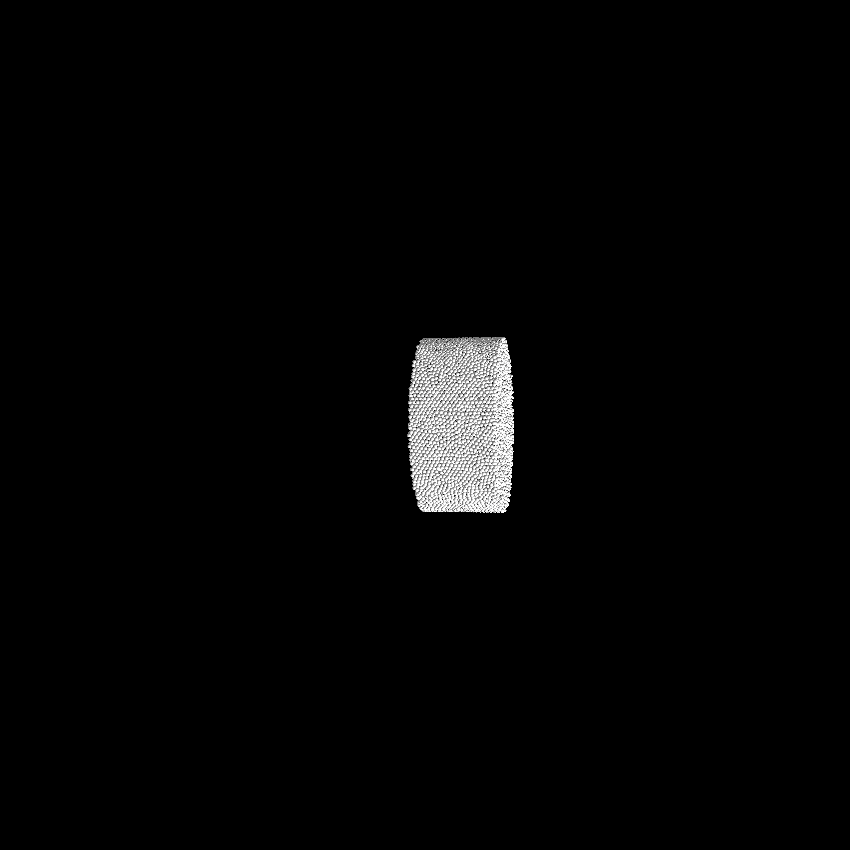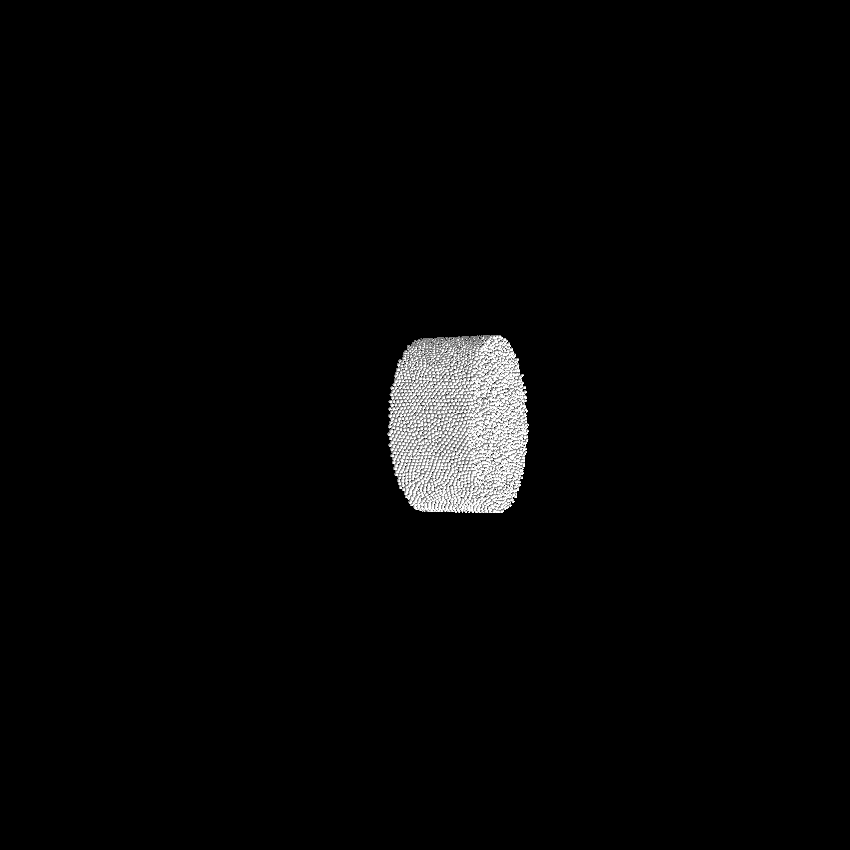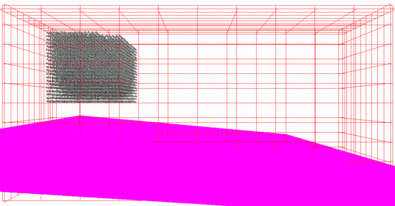SIMULATION
Hydrological simulation
Implementation of a hydrologic simulation model using parallel hardware (both CPU and GPU based).
Particle Simulation (Discrete Event)
Event driven molecular dynamics (EDMD) has become a recognized simulation method for granular materials. We are implementing a state-of-the-art simulator which handles carefully many of the difficulties one has to deal with to achieve an efficient and robust implementation. The simulator avoids particle overlap due to limited floating point precision, uses data structures to allow for large scale simulations, and is organized in its code to achieve a flexible framework which can be used in many different areas where an EDMD simulator is needed that guarantees overall good performance.
We have already a working application that incorporates many types of colliding objects (such as particles of different radii, planes, spheres, and cylinders), 2D and 3D simulation, real time visualization, and a large set of input/output operations.
Simulation results:
 Perpendicular view of a simulation of a granular jet hitting a plane: the color code indicates absolute particle velocity from white=jet-velocity to red=slow-moving.
Perpendicular view of a simulation of a granular jet hitting a plane: the color code indicates absolute particle velocity from white=jet-velocity to red=slow-moving. Oblique view of a simulation of a granular jet hitting a plane: the color code indicates absolute particle velocity from white=jet-velocity to red=slow-moving.
Oblique view of a simulation of a granular jet hitting a plane: the color code indicates absolute particle velocity from white=jet-velocity to red=slow-moving. 10000 particles falling on an inclined heated plane.
10000 particles falling on an inclined heated plane.
Particle Simulation (Direct Monte Carlo)
Direct simulation Monte Carlo (DSMC) is a standard method well suited to simulate large particle systems over long periods of time in order to obtain statistical information of the system especially for gases in the homogeneous cooling state.
We have implemented a working application that is capable of simulating a system of more than 100 Millions of particles on a standard PC.
Virtual laboratory for the Schrödinger equation
A simple Python-based open source software library for the numerical simulation of the linear or nonlinear time-dependent Schrödinger equation in one and two dimensions.
Open source code available at: https://github.com/pyNLSE/bpm
Simuladores e Inteligencias Artificiales Generativas
In the context of modern teaching in the area of Operting Systems, members of the research group have gathered valuable information combined with state-of-the-art tools to enhance both the teaching and the learning experience at university level.
Book: Simuladores e Inteligencias Artificiales Generativas en la Docencia de Sistemas Operativos.
Electromagnetic wave propagation
Financed Projects
-
Title: Servidor de cálculo científico de altas prestaciones
Start Date: 01/01/2013
End Date: 31/12/2015
Budget: 278239 €
Leaders: Xosé Antón Vila Sobrino
Funding Bodies: Ministerio de Economía y Competividad [UNVI13-1E-2283], European Union (FEDER Funds) -
Title: Consolidación e estruturación de unidades de investigación competitivas
Start Date: 10/10/2012
End Date: 20/11/2014
Budget: 70000 €
Leaders: Arno Formella
Funding Bodies: Xunta de Galicia [CN2012/231] -
Title: Continuación del proyecto: Desarrollo software para evaluar la capacidad de antenas MIMO en entornos celulares (válido para SPIN)
Start Date: 02/06/2009
End Date: 02/09/2009
Budget: 19200 €
Leaders: Arno Formella, Fernando Aguado Agelet
Funding Bodies: Telefónica I+D -
Title: Desarrollo software para evaluar la capacidad de antenas MIMO en entornos celulares (válido para SPIN)
Start Date: 03/10/2008
End Date: 30/11/2008
Budget: 33000 €
Leaders: Arno Formella, Fernando Aguado Agelet
Funding Bodies: Telefónica I+D [CO-0175-08] -
Title: Mejora de la implementación del modelo de propagación vertical para su uso en el simulador de MBMS
Start Date: 15/09/2006
End Date: 30/11/2006
Budget: 41500 €
Leaders: Fernando Aguado Agelet
Funding Bodies: Telefónica I+D -
Title: Validación del modelo de cálculo de pérdidas de propagación para microcélulas y macrocélulas urbanas (uso en el simulador MBMS)
Start Date: 01/06/2006
End Date: 31/08/2006
Budget: 12000 €
Leaders: Fernando Aguado Agelet
Funding Bodies: Telefónica I+D
Publications
-
Title: Temperature-dependent Smoluchowski equations
Year: 2020
Conference Name: 33rd M. Smoluchowski Symposium on Statistical Physics
Organizer: UJ Marian Smoluchowski Symposium
Type: Conference Contributions
Authors: Nikolai V. Brilliantov, Alexander Osinsky, Arno Formella, Thorsten Pöschel
-
Title: From optics to dark matter: A review on nonlinear Schrödinger–Poisson systems
Year: 2020
Journal: PHYSICA D: Nonlinear Phenomena
Editorial: Elsevier [10.1016/j.physd.2019.132301]
Issn: 1872-8022
Volumen: 403
Pages: 1 - 19
Type: Journal Articles
Authors: Ángel Paredes, David N. Olivieri Cecchi, Humberto Michinel
-
Title: Increasing temperature of cooling granular gases
Year: 2018
Journal: Nature Communications
Editorial: Springer [10.1038/s41467-017-02803-7]
Issn: 2041-1723
Volumen: 9
Pages: 1 - 9
Impact factor: 11.878
Base: JCR (Q1/D1)
Type: Journal Articles
Authors: Nikolai V. Brilliantov, Arno Formella, Thorsten Pöschel
-
Title: An Accelerated Tool for Flood Modelling Based on Iber
Year: 2018
Journal: Water
Editorial: MDPI - Open Access Publishing [10.3390/w10101459]
Issn: 2073-4441
Volumen: 10
Pages: 1 - 23
Impact factor: 2.069
Base: JCR (Q2)
Type: Journal Articles
Authors: Orlando García Feal, José González Cao, Moncho Gómez Gesteira, Luis Cea Gómez, José Manual Domínguez Alonso, Arno Formella
-
Title: An open source virtual laboratory for the Schrodinger equation
Year: 2018
Journal: European Journal of Physics
Editorial: IOP Publishing Ltd [10.1088/1361-6404/aac999 ]
Issn: 0143-0807
Volumen: 39
Impact factor: 0.861
Base: JCR (Q4)
Type: Journal Articles
Authors: Edgar Figueiras Gómez, Ángel Paredes, David N. Olivieri Cecchi, Humberto Michinel
-
Title: Iber as a tool to analyse flooding scenarios
Year: 2017
Editorial: MDPI - Open Access Publishing
Conference Name: 1st International Electronic Conference on Hydrological Cycle (CHyCle ? 2017)
Type: Conference Contributions
Authors: Orlando García Feal, José González Cao, Luis Cea Gómez, Arno Formella, José Manual Domínguez Alonso
-
Title: Exact calculation of the overlap volume of spheres and mesh elements
Year: 2016
Journal: Journal of Computational Physics
Editorial: Elsevier [DOI: 10.1016/j.jcp.2016.02.003]
Issn: 0021-9991
Volumen: 311
Pages: 142 - 157
Impact factor: 2.864
Base: JCR (Q1)
Type: Journal Articles
Authors: Strobl Severin, Arno Formella, Thorsten Pöschel
-
Title: Stable algorithm for event detection in event-driven particle dynamics
Year: 2014
Journal: Computational Particle Mechanics
Editorial: Springer [DOI: 10.1007/s40571-014-0021-8]
Issn: 2196-4378
Volumen: 1
Pages: 191 - 198
Impact factor: 2.206
Base: JCR (Q2)
Type: Journal Articles
Authors: Marcus N. Bannerman, Strobl Severin, Arno Formella, Thorsten Pöschel
-
Title: Granular Jet Impact: Probing the Ideal Fluid Description
Year: 2014
Journal: Journal of Fluid Mechanics
Editorial: Cambridge University Press
Issn: 0022-1120
Volumen: 751
Pages: 601 - 626
Impact factor: 2.514 (Q1)
Base: JCR 2015
Area: Mechanics
Type: Journal Articles
Authors: Arno Formella, Thorsten Pöschel, Patric Müller
-
Title: Contact of granular particles and the simulation of rapid flows using event- driven molecular dynamics
Year: 2008
Journal: European Journal of Environmental and Civil Engineering
Editorial: Taylor & Francis [(former Lavoisier)]
Issn: 1964-8189
Volumen: 12
Pages: 827 - 870
Impact factor: 0.306 (Q4)
Base: JCS 2013
Area: Civil Engineering
Type: Journal Articles
Authors: Arno Formella, Thorsten Pöschel, C. Krülle, C. Salueña, M. Heckel, Nikolai V. Brilliantov, Patric Müller, T. Schwager
-
Title: Site selecting algorithms for nodes B
Year: 2007
Journal: International Journal of Mobile Network Design and Innovation
Editorial: Inderscience Publishers
Issn: 1744-2869
Volumen: 2
Type: Journal Articles
Authors: Arno Formella, Fernando Aguado Agelet, Luis Mendo Tomás, José María Hernando Rábanos
-
Title: Granular gas cooling and relaxation to the steady state in regard to the overpopulated tail of the velocity distribution
Year: 2007
Journal: International Journal of Modern Physics C
Editorial: World Scientific Publishing
Issn: 0129-1831
Volumen: 18
Pages: 701 - 711
Impact factor: 0.728 (Q4)
Base: JCR 2013
Type: Journal Articles
Authors: Arno Formella, Thorsten Pöschel, Nikolai V. Brilliantov
-
Title: Optimisation of the antenna placement for an airport surveillance system
Year: 2007
Journal: International Journal of Mobile Network Design and Innovation
Editorial: Inderscience Publishers
Issn: 1744-2869
Volumen: 2
Pages: 209 - 215
Type: Journal Articles
Authors: Arno Formella, Fernando Aguado Agelet, Áurea Martínez Varela, Holger Neufeldt, Lino J. Álvarez Vázquez
-
Title: Impact of high-energy tails on granular gas properties
Year: 2006
Journal: Physical Review E
Editorial: The American Physical Society
Issn: 1539-3755
Volumen: 74
Pages: 041302 - 041302
Impact factor: 2.508
Base: JCR 2013
Type: Journal Articles
Authors: Arno Formella, Thorsten Pöschel, Nikolai V. Brilliantov
-
Title: Deterministic modelling and acceleration techniques for ray-path searching in urban and suburban environments
Year: 2002
Journal: COST Action 255 Final Report: Radiowave propagation modelling for SatCom services at Ku-band and above
Editorial: European Space Agency (ESA) Publications Division
Isbn: 9-290-92608-2
Pages: 4.6.-1 - 4.6.34
Type: Book Chapters
Authors: Arno Formella, Fernando Aguado Agelet, Peter Cullen, José María Hernando Rábanos, C. Brennen
-
Title: Optimization methods for optimal transmitter locations in a mobile wireless system
Year: 2002
Journal: IEEE Transactions on Vehicular Technology
Editorial: IEEE Society
Issn: 0018-9545
Volumen: 51
Pages: 1316 - 1321
Impact factor: 1.308 (Q2)
Base: JCR 2013
Area: Electrical and Electronic Engineering
Type: Journal Articles
Authors: Arno Formella, Fernando Aguado Agelet, Áurea Martínez Varela, Lino J. Álvarez Vázquez, José María Hernando Rábanos
People Involved
- Aguado Agelet, Fernando
- Bannerman, Marcus N.
- Brilliantov, Nikolai V.
- Cea Gómez, Luis
- Cullen, Peter
- Domínguez Alonso, José Manual
- Figueiras Gómez, Edgar
- Formella, Arno
- García Feal, Orlando
- González Cao, José
- Gutiérrez Novoa, Diego
- Gómez Gesteira, Moncho
- Hernando Rábanos, José María
- Martínez Varela, Áurea
- Mendo Tomás, Luis
- Michinel, Humberto
- Müller, Patric
- Neufeldt, Holger
- Olivieri Cecchi, David N.
- Osinsky, Alexander
- Paredes, Ángel
- Pöschel, Thorsten
- Severin, Strobl
- Wieker, Horst
- Álvarez Vázquez, Lino J.
Student Work
-
Title: Mejora de un simulador de partículas para su uso en procesadores multinúcleo
Year: 2012
Volumen: ENI-321
Type: Master's Thesis
Authors: Adrián Crestar Santomé
-
Title: Extensión de una interfaz gráfica para un simulador de partículas e incorporación de datos de salida mediante un observador dinámico
Year: 2009
Volumen: INX-859
Type: Bachelor's Thesis
Authors: Diego Gutiérrez Novoa
Press Articles
- (09/04/2022)El Campus Auga premia a sus mejores investigadores
- (08/04/2022)Os Premios do Campus Auga distinguen o talento das e dos investigadores da UVigo no eido dos recursos hídricos
- (07/03/2022)Seis traballos acadan os IV Premios de Investigación, Transferencia e Divulgación Científica do Campus Auga
- (06/04/2021)O físico Daniele Tommasini desenvolve novas solucións en forma de series infinitas para as ecuacións de Kepler
- (24/03/2021)O programa Iber presenta novas funcionalidades para a xestión eficiente de eventos de risco
- (22/12/2020)Unha tese desenvolve novos algoritmos para mellorar as simulacións de experimentos de física
- (16/12/2019)Seis estudos e unha iniciativa gañan os II Premios de Investigación, Transferencia e Divulgación Científica do Campus da Auga
- (16/12/2019)El Campus da Auga reconoce seis estudios de investigación
- (23/03/2018)(Science Daily) Law of particle dynamics of granular gases: Increasing temps in cooling systems
- (08/03/2018)(Pro-Physik) Wenn Teilchen aneinander haften
- (02/03/2018)Un asombroso efecto froito dunha sutil interacción
- (02/03/2018)Un profesor da UVigo asina un estudo sobre un curioso fenómeno nos gases granulares
- (05/12/2016)De la bioinformática a la simulación aeroespacial





